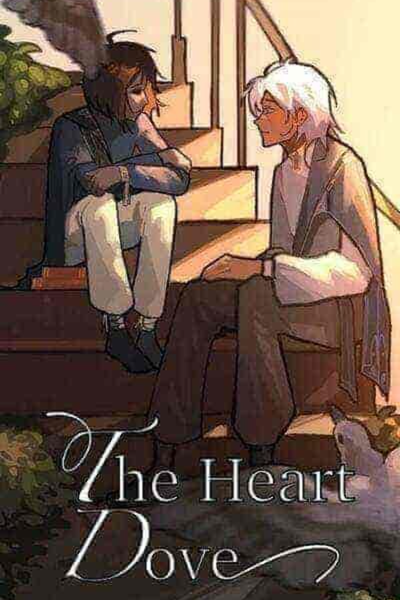“Kolupati,” Libum warned, already knowing where the conversation was leading to. “I don’t want to work with them. Assign them a different partner.” She waved her hand in dismissal, an arrogant refusal to what Libum demanded that morning. Shouldn’t a celestial being have more tact than acting like a child? He silently prayed that by some miracle, the soul would remember everything now and move on.
“Do you accept these terms?” asked Kolupati, blatantly ignoring the protests. The soul looked to both of them. “Would you like to form a contract with me, anuk?”
No, Libum whispered inside his head. No, no. Say no, you idiot.
“What happens if I attempt to move on as I am?” they said. “If I just have my soul judged as it is, without any memories or the life I lived attached to it?”
Kolupati sighed as if she were expecting this question. Libum wasn’t. Souls were often too dazzled by Kolupati at that point to do anything except agree. He thought that their hesitation would mean a different outcome.
“This is tricky, you know. You’re a soul who no longer has a name or a family to return to. You don’t know who you are.” She reached out and caressed the soul’s long black hair and Libum flinched as rivulets fell from it. “You came to me. If you pass on without remembering, your afterlife is a complete gamble. There will be no family history to take into account, no luck passed down, no generational deals with any Gods. Your soul will be judged as is.”
“Is that so bad?”
Libum thought this a question of only the most naive. Depending on how a person lived, and what they devoted themselves to, whether they led a life of grace and kindness or a life that brought tragedy to everyone and everything around them; marks such as these mattered in the grand scheme of things. It would be added into the decision of what one's afterlife consisted of. Ultimately, if a person earned a spot in suffering or in tranquility.
Not that it mattered to a man like Libum.
“Most of us don’t want to move on without our ancestors guiding us, diba? Your memories, the life you lived up until you died, even your physical body. They’re all lost. What would your parents think? Your ancestral family? You could have a wonderful afterlife waiting for you.”
“That means I could have a horrible one, too. But, since I don’t have any memory, I have no one to care about. If I came here with nothing, then I can just be nothing, right? A clean slate?” Both of their mouths agape, Libum and Kolupati stared at the smirking soul. Kolupati moved closer and hugged them tight against her.
“No matter who you are,” the God said warily. “Someone will always mourn you when you die. Whether you deserve it or not, whether you think you have an effect on others’ lives or not, someone cares for you. You’d have just turned into multo if you didn’t have someone who cared about you. A reason, grief that brought you to this place. Even Libum here has that.”
“Do you know about my life?” asked the soul, their thick eyebrows knitting together tightly. “You’re the God of Death, right? You must have some details about my fate.”
Kolupati shook her head, and her smile faltered.
“I don’t have access to the answers you want. I carry only fragments. Bits and pieces of your life that ultimately don’t mean much. All the important information you want is inside you, somewhere. It just needs to be remembered.” Kolupati murmured something in the ear of the soul, too quiet for Libum to hear. The soul glanced over at him, and he felt the hair on the back of his neck rise. The anxiety within the small space was palpable, so thick in the air that it felt like it swallowed them. “Looking at you now, I have faith for when your memories return.”
“Wait.”
Libum dug through the pouch of coins he’d accumulated over the week. With a toss, he threw one to Kolupati. The soul remained in a trance, and she snapped her fingers to remove them. “What’s this for?” they asked, coming back to themself.
“In order to form a contract with me, you must offer me collateral,” she said plainly. “Your soul. Your heart. Bulawani can be used, too, which is our currency, but most souls don’t have that on their person when they die. Given your circumstances, I didn’t bother to ask.”
“You were just going to take my soul?” they asked, with a wavering voice. Could this be anger? Libum smirked as their voice rose, but the smile just as soon depleted itself when they began to laugh.
“I’d give it back,” she said breathlessly, a sign that she was trying not to laugh alongside them. “Once you fulfill your contract.”
“Take it,” they insisted. “My heart, my soul. Whatever. Take what you want, Kolupati. I’ll work for you.”
Libum watched, with his mouth slightly open, until Kolupati leaned forward and closed it for him. “You will work as an Anito, then. A soul bringer who collects lost souls for me. Lost soul who is bound to me, hear your name, and do my bidding. For now,” her voice dripped like honey. “I must bless you with a Title. A name to attach yourself to my realm—this decreases the chance of becoming multo. Your Title will be Tikba, from the Tikbalang.”
Libum concealed his snort.
“Do I have to start praying in your name?” asked Tikba. “I don’t remember a thing, but I don’t think I’ve ever been particularly devoted to any God.”
“Believe in whatever you wish,” she said. “I don’t force beliefs onto the people who come here. There are more things to concern oneself with than what God they devote themselves to. Just focus on getting those memories returned to you.”
Kolupati’s hand covered Tikba’s, lips moving as she pressed a kiss against their forehead. She murmured something again, but Libum still couldn’t hear. Tikba went limp, their body falling backwards, and Libum leapt forward and caught the falling soul from crashing into one of Kolupati’s chairs.
“Heavier than they look,” remarked Libum. He was not the kind of man to judge someone for their looks, but as wetness began rapidly covering his arm, he felt disturbed for the first time in years.
From the two black holes in the soul’s face, water sprung like broken fountains.












Comments (1)
See all